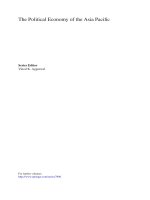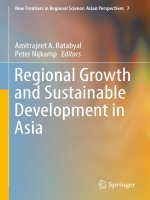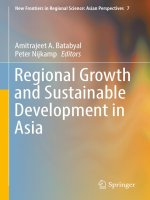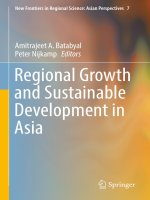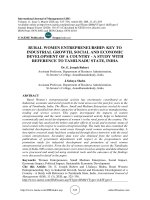Economic growth and economic development 42
Bạn đang xem bản rút gọn của tài liệu. Xem và tải ngay bản đầy đủ của tài liệu tại đây (61.85 KB, 1 trang )
Introduction to Modern Economic Growth
civil war, military coups, extreme corruption and an overall environment failing to
provide incentives to businesses to invest and upgrade their technologies. It therefore seems necessary to look for fundamental causes of economic growth that make
contact with these facts and then provide coherent explanations for the divergent
paths of these countries. Jumping ahead a little, it will already appear implausible
that luck can be the major explanation. There were already significant differences
between South Korea, Singapore in Nigeria at the beginning of the postwar era. It
is also equally implausible to link the divergent fortunes of these countries to geographic factors. After all, their geographies did not change, but the growth spurts
of South Korea and Singapore started in the postwar era. Moreover, even if we
can say that Singapore benefited from being an island, without hindsight one might
have concluded that Nigeria had the best environment for growth, because of its
rich oil reserves.2 Cultural differences across countries are likely to be important
in many respects, and the rapid growth of many Asian countries is often linked to
certain “Asian values”. Nevertheless, cultural explanations are also unlikely to provide the whole story when it comes to fundamental causes, since South Korean or
Singaporean culture did not change much after the end of WWII, while their rapid
growth performances are distinctly post-war phenomena. Moreover, while South
Korea grew rapidly, North Korea, whose inhabitants share the same culture and
Asian values, had one of the most disastrous economic performances of the past 50
years.
This admittedly quick (and perhaps partial) account suggests that we have to
look at the fundamental causes of economic growth in institutions and policies that
affect incentives to accumulate physical and human capital and improve technology. Institutions and policies were favorable to economic growth in South Korea
and Singapore, but not in Nigeria. Understanding the fundamental causes of economic growth is, in large part, about understanding the impact of these institutions
2One
can then turn this around and argue that Nigeria is poor because of a “natural resource
curse,” i.e., precisely because it has abundant and valuable natural resources. But this is not an
entirely compelling empirical argument, since there are other countries, such as Botswana, with
abundant natural resources that have grown rapidly over the past 50 years. More important, the
only plausible channel through which abundance of natural resources may lead to worse economic
outcomes is related to institutional and political economy factors. This then takes us to the realm
of institutional fundamental causes.
28



